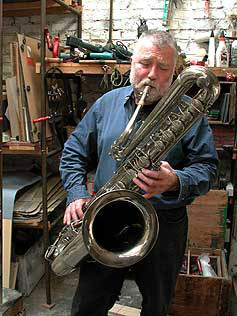

So things come in your mind, or the instrument gives you something to work on, and I think in that case you can't say 'improvised' because the material is in your brain and you use it in many ways. PB: I think being busy so long with the instruments, with the language, the borders between improvisation and playing tunes, pieces, or fixed material, they are fluent. So the solo is a very delicate thing.ĪAJ: Would you still consider solo playing 'improvisation'? Sometimes you see for yourself, "Oh my God, that was a wrong moment." that happens. But, from time to time it's necessary just to know where you are. So, for me it is always very different from playing in a group.

You mentioned language-wise, and that is really always the point if you discover for yourself a couple of new things, a couple of new 'words' or ways of 'talking'. It's hard physically and it's hard for the mind and for the brain. It's hard work to catch the attention of an audience for, let's say, an hour solo. So I think the challenge part is very important, if you play solo concerts for an audience. I think you have to have certain ideas, even if during the recording you forget about the ideas, but if there is time for you to record a solo thing, it's always a special moment, and always a special challenge too. Any solo performance is a different thing, and especially if you record a solo album. I was wondering how you feel they are different, or do you feel they are pretty much the same? Sure, that is a possibility, but that has never been my thing.ĪAJ: How do you view your solo saxophone playing in relation to your work in groups? Derek Bailey has set up a number of ideas regarding both, and one he views as true improvising and the other is maybe perfecting your language but not necessarily improvising. Of course, there are guys in our business, developing musicians or theoretical, thinking guys developing certain why and why-not and how this works and how that works. I like to play, I like the horns I like the way they sound of course that's one of the main points to work with others, that's why I like it. I never was a guy who saw this kind of music as a kind of intellectual game or challenge. I think that still is the main important thing for me. The instrument, to play with the guys, with the drums and the bass, that was just the fun of it. Of course, there came a time where I took it more and more serious but mostly from the playing side. Peter Brotzmann: No, actually there was never a time I was thinking about why and how or whatever, getting into music just because I like to play, getting into it as an amateur and playing this Dixieland swing stuff. We thank Peter Br'tzmann and Clifford Allen for allowing us to publish exerpts from their interview.Īll About Jazz: I'd like to know whether you've ever engaged theories of process specifically in your work, or is there any philosophical grounding with respect to your music? He recently sat down with Masters Degree candidate in Art History Clifford Allen during the opening of Br'tzmann's work on paper show The Inexplicable Flyswatter at the Art Institute of Chicago. His playing, brash and aggressive, continues to destroy speakers worldwide.
.jpg)
Br'tzmann's career began in art, experience he would take into his music and record label FMP. Peter Brotzmann has exemplified European improvised music for over 40 years and particpated in countless international collaborations.


 0 kommentar(er)
0 kommentar(er)
